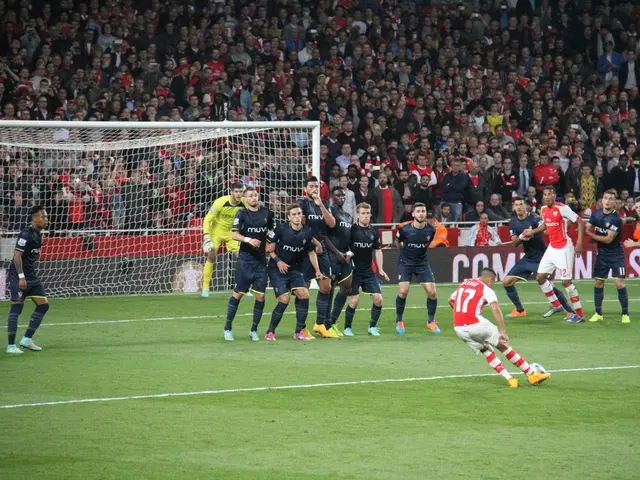Las Vegas Casinos' Q1 Earnings: Bullish Spirits Nevertheless
Corporate Las Vegas praised for solid first-quarter financial performances, say financial experts
In the whirlwind of a potential economic downturn, analysts are stubbornly optimistic about Vegas' casino bigwigs despite their less-than-stellar pace in Q1. Buck Wargo, our website's analyst dives into the latest earnings of MGM Resorts International, Caesars Entertainment, Boyd Gaming, and Red Rock Resorts.
With Nevada's gaming revenue and visitation falling behind its 2024 pace, issues like a negative Q1 GDP and tariffs have cast a cloud over the macro-economy. However, casino executives and financial analysts refuse to back down, proclaiming, "Not so fast!"
First-quarter earnings for MGM and Caesars proved to be a breath of fresh air, with both companies beating their earnings before interest, tax, depreciation, and amortization (EBITDA) targets. Las Vegas and regional segments surpassed expectations, giving analysts like Bank of America's Shaun Kelley a reason to stand firm.
Kelley's note to investors last week read, "State of the consumer: Not seeing meaningful cracks". He noted MGM's slightly shorter booking window amid uncertainty, but reassured that room revenue is still thriving. Caesars also reported solid forward bookings in Las Vegas and commendable regional trends continuing into April.
Caesars' Q1 revenue/EBITDAR reached $2.79 billion/$884 million, edging out the Street's predictions. Las Vegas revenues amounted to $1.003 billion, finishing just 2% shy of Bank of America's expectations, while its EBITDA stood at $433 million, demonstrating tight cost control.
In the regional arena, EBITDA for Caesars amounted to $440 million, aligning with Bank of America's forecasts and surpassing the Street's assessment. Kelley highlights that regional demand has remained resilient, and EBITDA can grow year-over-year in 2025 due to renovations in New Orleans and Danville, Virginia.
Caesars Digital also made a splash, boasting EBITDA of $43 million that surpassed the Street's prediction. iGaming revenue increased by a whopping 40% YoY, surpassing the market's 27%. Management indicated that iGaming net gaming revenue is tracking up by a staggering 70% in April.
Despite a 7% decline in online sports betting handle in the first quarter, Caesars has managed to tweak its promotional strategy towards profitable customers, lowering overall promo to 17%.
MGM's Q1 reporting was no less impressive, besting expectations with revenue/EBITDAR of $4.28 billion/$1.181 billion. Las Vegas EBITDA hit $774 million, driven by solid cost control. April proved to be a record month for room revenue, further boosting its performance.
In digital, BetMGM's performance outshone expectations, with online sports betting net gaming revenue increasing by a staggering 68% YoY, despite reduced promotions. MGM has also increased its budget for Osaka development in Japan, now anticipating $600 million to $700 million of annual equity contribution over the following four years.
Many investors remain wary of the growing likelihood of a recession, but analysts like John DeCree, director of equity research at CBRE, remain unshaken in their optimism for MGM and Las Vegas. He suggests that the city is far more capable of weathering a possible economic storm than in previous cycles.
MGM's resilience can be attributed to the reduced hotel room supply growth, a stronger convention industry, a robust live entertainment draw, a thriving sports tourism market, and its partnership with Marriott Bonvoy. With 185 million Bonvoy members under its belt, MGM is well-prepared to bring quality customers to its hotels even during a potential recession.
CBRE estimates that Bonvoy customers account for roughly 8% of MGM's room nights at higher room rates and on-property spend than transient customers. With early success, MGM is working to expand this partnership, recently extending loyalty benefits to group and convention customers as well.
Caesars refuses to be left behind, boasting positive forward indicators from both leisure and group customers. With 2025 shaping up to be a record year for group bookings, Caesars is confident that EBITDA growth in Las Vegas will remain modest.
While faith remains high, it will be prudent to keep an eye on the performance of these casino operators as the year unfolds. But for now, it seems that the curtains are still open on the Las Vegas casino scene.
- Despite the economic uncertainty, financial analysts like John DeCree remain optimistic about MGM Resorts International's resilience, attributing it to factors such as reduced hotel room supply growth and a robust convention industry.
- Caesars Entertainment has taken a strategic approach to managing online sports betting, lowering overall promotions even during a 7% decline in handle, and has seen success in their iGaming revenue, which increased by 40% YoY.
- Analysts like Shaun Kelley are encouraged by the solid forward bookings in Las Vegas for Caesars Entertainment and MGM Resorts International, which continue into April, and the EBITDA growth in the regional arena.
- The booming casino culture in Las Vegas has not gone unnoticed, with Analysts Buck Wargo and Shaun Kelley both noting the thriving room revenue and booking window for MGM and Caesars, respectively.
- As casino operators like MGM and Caesars continue to innovate, such as Caesars Digital's EBITDA surpassing expectations and MGM's expansion of its partnership with Marriott Bonvoy, it's clear that the Las Vegas casino-and-gambling industry will remain a hot topic among analysts and casino personalities.







